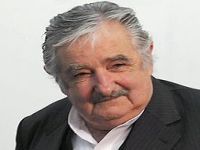Mujica explains legalizing marijuana
In the domains of his small farm a half hour drive from Montevideo, José Mujica just made his annual harvest of spinach. But as president of Uruguay, he will oversee an unprecedented experiment and a much disputed cultivation: the country of 3 three million people will soon become the first in the world to legalize, regulate and participate in the production, sale and taxation of marijuana.

The "revolution of the herb" Uruguay is under the scrutiny of the entire world as international leaders struggle with the critical deterioration of the long "war on drugs".
Mujica, a former guerrilla fighter and political prisoner now 78 years of age, made headlines after his decision to abstain from the presidential palace in favor of his mansion in ruins and 90 % of his salary. But in an interview with the Telegraph on the front of his poorly lit room bungalow, where he has lived for 30 years, the heating provided by an old wood stove, he expressed surprise at the international controversy.
"We have in our sights drug trafficking," he said. "It's not a law to support the addiction. It is a way to combat the black market economy."
Mujica sounds lyrical, even when I talk about the scourge of drugs. "Every addiction is a plague, except love," said the president, whose only flirtation with substance abuse is the cigarette.
"If you take two whiskeys every day, it is ok, although it is not good. But if you take a whole bottle every day, then you have a problem and should be treated."
Under a radical new law, which takes effect this month, not only citizens and private companies are allowed to grow, buy and sell cannabis, as also, the government enters into the business - cultivating and harvesting the crop, distributing , selling and taxing profits. The legislation is far more radical than the famous liberal Netherlands, where farming remains prohibited or new agreements in the states of Colorado and Washington, where there is no direct involvement of the U.S. government.
Mujica and his allies argue that the new policy offers an innovative alternative to what they call the failures of the "war on drugs" advocated by the U.S. in Latin America, which has killed tens of thousands of people in producing countries, while little is done in the consumer countries, the United States and European countries.
With its main port in Montevideo and its borders with Brazil, Argentina and Paraguay, Uruguay has an experience as a transit point for trafficking across the continent and to Europe. "The drug is produced mainly in Latin America, but the largest consumers are the rich countries," Mujica said , echoing a familiar lament the leaders of the region.
The law aims to strike a blow on cartels by removing one of their biggest means of earning money. "If you want to change the reality, it is foolish to keep doing the same thing instead of changing something, even if it is not successful," said Mujica.
With the new law, the Uruguayans will be able to purchase a limited amount of cannabis, which should be 40 grams per month, for a competitive price in pharmacies or shops usually used to pay bills or to exchange money.
Users will have to register on a database held by the government and those who make excessive requests will be sent to the health authorities for treatment. The database also aims to ensure that only the inhabitants of Uruguay buy the goods and thus reduces the risk of drug tourism.
The marijuana law is one of three laws by the Mujica-led government - in his second term with the leftist coalition Frente Amplio - to give Uruguay the most unlikely reputation for being the most liberal country in Latin America. Same-sex marriage was introduced last September, while a year before abortion was legalized.
But in the Catholic and conservative country, opinion polls have shown that many Uruguayans do not like the "revolution of grass." Opposition comes from both those who believe that this will encourage the use and those who simply do not support the "nationalization" of the trade in cannabis .
His critics cite the recent reaction in the Netherlands , where possession of up to five grams of marijuana has been legal since 1976 and recently banned sales to foreigners in their cafes. Mujica says his opponents are just "scared" with such a dramatic change.
He also admitted that the new law could pave the way for the decriminalization of other drugs. There are, however, practical challenges to implement the ambitious new policy challenges because for now, Uruguay does not produce enough to meet demand.
The leaders of the Frente Amplio, including Sen. Lucia Topolanski, who is also the first lady, suggested that Canadian producers of medical marijuana will fill the gap in the interim. "To begin with, we will have to buy cannabis," she said recently. "I think we will buy from Canada because there is a better quality product." This was news to Canada, where a spokesman of the Ministry of Health said there was "no plan" to export marijuana to Uruguay or anywhere else.
For Mujica, his role at the forefront of international drug policy is another chapter of a remarkable life. As he prepares to leave office next year and plans to set up a school to teach agriculture on his beloved farm, the self-declared atheist reflected on his time. "They say I'm a poor president, but I 'm not," he said. "I 'm a sober president."
"I got used to living for many years in a dungeon where on the nights when I had a mattress I was happy. I cannot believe in God, but I believe every day a little more in nature. I learned this simple lesson: life is beautiful, then you have to live it with intensity and pursue happiness."
Source : Political Pragmatism
http://www.patrialatina.com.br/editorias.php?idprog=a77054e9d6c3fb75907aed15140ca1e6&cod=13604
Subscribe to Pravda.Ru Telegram channel, Facebook, RSS!

